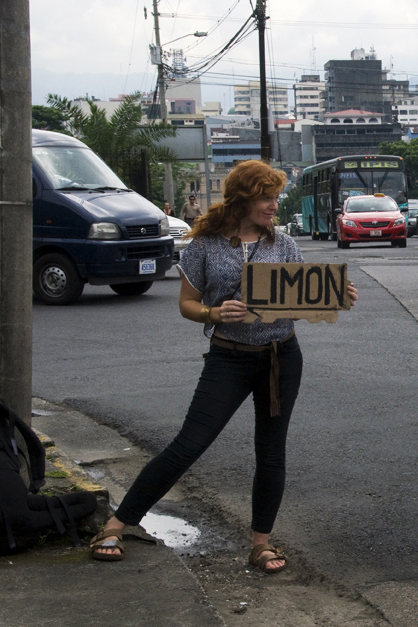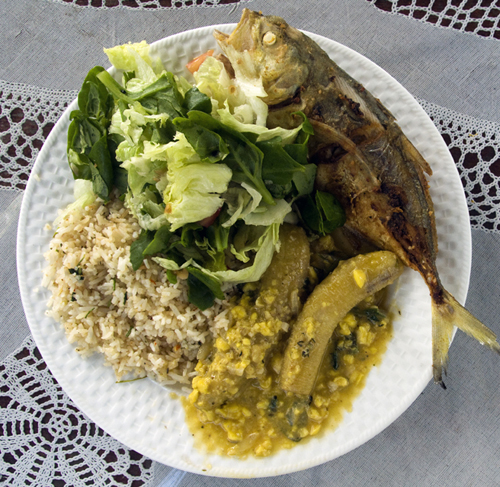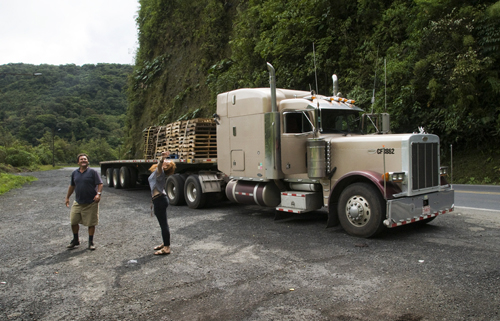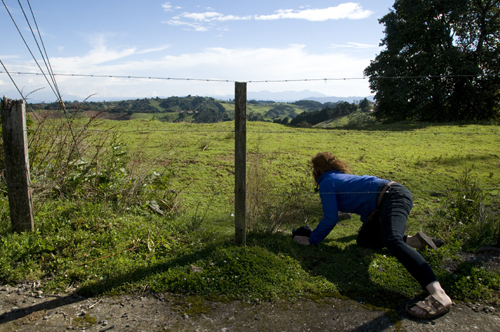A Cheap Bastard’s Guide To Traveling
Pan-American Transmissions Part 3: Costa Rica
“Pan-American Transmissions” is a travel series from Special Contributor Diego Cupolo as he travels south from Nicaragua to Argentina. He has few plans, a $10-a-day budget and one flute-playing gypsy companion. Check back as new dispatches are posted from the road.
They warned us about Costa Rica.
Young travelers, broke travelers, I-do-this-for-a-living travelers — they all sped through it. They wanted nothing to do with it. For them, Costa Rica was a blank spot between Nicaragua and Panama where everything costs more and every place is packed with North American families peeing in small swimming pools in front of grand, beautiful oceans.
“The Switzerland of Central America” they called it.
Sure, Costa Rica is significantly more expensive than its neighbors, but this alone is no reason to skip a country so full of lush biodiversity and untamed landscapes. In fact, price tags are no reason to skip any country.
As I wrote in my last post, you don’t need money to travel. Creativity and discipline are much more valuable when on the road.
Ania and I passed a few weeks exploring Costa Rica’s cloud forests and Caribbean beaches. Even with our small budget, we found it relatively manageable and thoroughly enjoyable. Using a myriad of patented, tried-and-tested techniques we spent no more than $8 a day each.
The following is a cheap bastard’s guide to traveling. While each point is taken from our time in Costa Rica, these “strategies” work in most countries and should help budget travelers survive anywhere in the world.
When done right, traveling can be cheaper than staying at home. Here’s how.
 Hitchhike
Hitchhike
First for a reason. Hitchhiking is not only a free ride, but one of the best ways to meet locals. You never know where a good conversation will take you. Truckers are usually the most helpful and also the most lonely. (The two probably go together.) They drive long distances, like to talk and know all the best, cheapest roadside eateries.
Don’t feel safe riding with strangers? Look the driver in the eyes before jumping on board. Evil is easy to spot. Drug addicts, even easier. If it doesn’t feel right, it probably isn’t. Just remember, most people don’t drive around looking for someone to kill or rob. Most people, unlike what you see in movies, are amazingly nice and incredibly humane.
Bring a tent
It’s a good idea to have a backup home in your bag. Packing a lightweight tent can save money and reduce stress. No matter what happens, you’ll have shelter. Even better, hostels with backyards usually let travelers set up camp at a fraction of the cost for a room.
Ania and I usually pitch our tent outside hostels, but the beaches near Puerto Viejo seemed safe enough so we decided to camp on the white sand under the bright stars. Free, marvelous and refreshing after a night in Rocking J’s obnoxious warehouse hostel (avoid at all costs).
Lonely Planet, Schmonely Schmanet
Of course, this popular backpacker’s guide can be helpful, but Lonely Planet is not God. It does not see all nor explain all and, as result, can affect travelers’ experiences, for the worse, when they follow it too closely.
This is especially true for accommodation. There’s always cheaper options than the ones in the guide. When a hotel is listed in Lonely Planet, its price goes up. This is a fact. Instead, consult taxi drivers, traveling artisans or, even better, local hookers. They might laugh at first, but they’ll point you towards the cheapest (and probably most exciting) place in town.
Couchsurfing
It’s like Facebook, but useful. Couchsurfing is one of the best resources for travelers on the Internet. It lets people host and be hosted by members around the globe, and it’s free, easy and safe thanks to a internal review system.
Couchsurfing not only allows the unique opportunity to meet and temporarily live with locals, but it’s extremely helpful in urban areas. Knowing someone in a big town makes the difference between another confusing city experience and being invited to the neighbor’s uncle’s all-night pig roast.
Ania and I, emaciated from parasites in Nicaragua, were brought back to health by the generous meals of a generous couchsurfing family in Naranjo. Thanks again Andrés!
 Cook!
Cook!
Street carts, farms, dumpster-diving, supermarkets, street markets. Food: You need it every day and there’s a thousand ways to approach the matter. While restaurants can be the easiest and fastest option, their prices and portions can vary drastically. Sometimes you get a deal, other times you get undigestible slop. The most reliable, cheapest and healthiest way fill your stomach is to cook.
Try staying in places with kitchens as much as possible. Rice, pasta, beans, potatoes, eggs — they’re all filling and they’re all cheap. A personal favorite is oatmeal. It’s lightweight, wholesome, can be eaten raw or cooked, and it’s delicious when mixed with local fruits and milk.
On the subject of “local,” eat what the locals eat and what grows locally if you want to save money. Costa Rica was banana and pineapple land so I mixed bananas and pineapples with my oatmeal every morning. It’s that simple.
Also, keeping salt and few spices handy can turn a bland dish into a fine dining experience.
Enter Parks Through the Back Door
Some might say this is wrong, but since when did nature have a price? Putting up a fence and demanding entrance fees is usually a scam. I’d be happy to pay if the money went towards park maintenance, but that rarely happens.
Skip entrance fees by finding alternative entrances.
In Cahuita, Ania and I asked around and found there were two entrances to the national park. One entrance was for tourists and charged $10 a person, the other was for locals where you were simply asked for “donations.” We paid a dollar each and spent the rest of the day watching howling monkeys and sloths climb through palm trees over pristine caribbean waters.
Work, Exchange, Sell, Juggle
Yes, work. Travelers can usually make arrangements with local business owners to work a little in exchange for free room and board. The easiest places to do this are hostels, farms and boats, but the possibilities are endless. Any place that keeps money out of the equation is a good place.
Not to mention, the best way to know a country and its people is to settle down and work for a while.
For the independently minded, starting your own business can be surprisingly easy on the road. Just ask a fellow street vendor who is often from elsewhere in the region. They can be found on sidewalks throughout Central and South America selling jewelry, crafts and magic stones. They do it because it works. People love to buy stuff from the streets and this addiction can pay for your travels — sometimes for years.
Also try juggling things, riding unicycles, spitting fire, playing instruments or selling food — use your imagination. As capitalism has proven over and over again, money can be made from anything. I met a French couple that paid for their travels by selling colored pipe cleaners bent in the shape of little spiders.
Hell, you could even become a travel writer and send rambling nonsense to magazines and web sites if you feel like it.
Final points
- Go slow.
- Always ask a local.
- Buses cost more in bus stations — catch them on the road.
- Always bargain.
- Don’t pay the first price they give you, but don’t be an asshole.
- Put the money in their hand to put a quick end to negotiations.
- Travel in small groups to split rooms and expenses.
- Nature is free.
- Walking is free.
- Drink on an empty stomach.
- And, lastly, carry soap and rope to wash and dry your clothes you damn snob.
By Diego Cupolo
Read Part One of Pan-American Transmissions (Northern Nicaragua) here and Part Two (Southern Nicaragua: Bargain Paradise) here.
Coming soon from Pan-American Transmissions: Panama City Booming.

About the Author
 Diego Cupolo is a freelance photojournalist currently on the road to Tierra del Fuego. Most recently he served as Associate Editor for BushwickBK.com, an online newspaper in Brooklyn, and his work has appeared in The New Yorker, The Atlantic, The Star-Ledger, The Australian Times, Discover Magazine and many other publications. View more of his work at DiegoCupolo.com.
Diego Cupolo is a freelance photojournalist currently on the road to Tierra del Fuego. Most recently he served as Associate Editor for BushwickBK.com, an online newspaper in Brooklyn, and his work has appeared in The New Yorker, The Atlantic, The Star-Ledger, The Australian Times, Discover Magazine and many other publications. View more of his work at DiegoCupolo.com.


